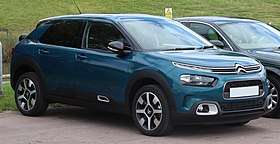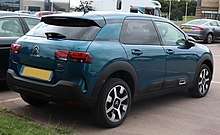Citroën C4 Cactus
The Citroën C4 Cactus is a subcompact crossover SUV, produced by French automaker Citroën in Spain between April 2014 and December 2017, with production of the second generation commencing in October 2017 (until May 2020 in Villaverde), with the final months of production being disrupted by the COVID-19 pandemic. The C4 Cactus is considered a compact SUV, although it is based on the PSA PF1 platform that underpins the smaller Citroën C3 and DS3.
| Citroën C4 Cactus | |
|---|---|
 | |
| Overview | |
| Manufacturer | Citroën |
| Production | April 2014 – Present |
| Assembly | Spain: Villaverde (Madrid) Brazil: Porto Real |
| Body and chassis | |
| Class | Subcompact crossover SUV |
| Body style | 5-door SUV |
| Layout | Front-engine, front-wheel-drive |
| Platform | PSA PF1 platform |
| Related | Citroën C3 DS 3 Peugeot 208 Opel Crossland X |
| Powertrain | |
| Engine | 1.2 L PSA EB2 Puretech I3 (petrol) 1.6 L HDi 16V I4 (diesel) |
| Dimensions | |
| Wheelbase | 2,595 mm (102.2 in) |
| Length | 4,157 mm (163.7 in) |
| Width | 1,729 mm (68.1 in) |
| Curb weight | 965 kg (2,127 lb) - 1,070 kg (2,360 lb) |
| Chronology | |
| Predecessor | Citroën C4 (2018) |
| Successor | Citroën C4 (2020) |
A distinctive design feature is the "AirBump" panels on the car's sides, designed to protect the vehicle from damage in car parks. The Citroën Cactus Concept, presented at the 2013 Frankfurt Motor Show, previewed the production version.[1] The C4 Cactus was presented at the 2014 Geneva Motor Show.
Production and sales
_Exclusive_wagon_(26065998025).jpg)


Production started in April 2014 at PSA's factory in Villaverde, Madrid. Sales commenced in France in June 2014. It is a five door SUV in Touch, Feel and Flair trim levels, and is powered by 1.2 L inline-three petrol engines and 1.6 L inline-four diesel engines.[2][3]
In 2016, three more trim levels were added to the C4 Cactus range: Flair Edition, Rip Curl and W. Slow sales of the W have led to the model being dropped from the line up; 30% of Cactus sales in the United Kingdom are of black cars with black Airbumps.
In October 2016, production of the vivid paint colour Lagoon Blue ceased, and was replaced by a new colour Baltic Blue, which is more subtle. A rich, dark red called Jelly Red, was added to the range of colours available. In May 2017, the popular Shark Grey ceased in favour of Platinum Grey, which is slightly darker and used on the DS4 and the 2016 Dispatch van.
In Italy, the W is called the Total White edition; there is also a Total Black edition and these models are called OneTone in some markets. There is no Total Black model in the United Kingdom, but it can be configured, and would need black gloss wheels to conform.
The Cactus is sold in Australia, New Zealand, Hong Kong, South Africa and South America, and so it is a 'world car' in that respect. The Cactus was tested by Euro NCAP, and scored highly in the pedestrian safety test, the best in its class, due to the car's curved shape at the front. This achievement is matched by few other cars tested. Cactus was the first passenger car to have the front passenger's front facing air bag mounted in the roof lining, which also allowed the glove-box to be larger than most competitors.
The Rip Curl is a collaboration with the surfing brand of the same name and is marketed as a more adventure based vehicle, with its 'Grip Control' feature meaning the driver can adjust the car to driving on either tarmac, snow, mud or ice.
This works by the ECU adjusting the power delivery to each of the front wheels independently, based on whichever wheel has more grip at any one moment. Aside from fourseason Goodyear tyres, all other changes are purely aesthetic, with 'Rip Curl' graphics and orange seat belts amongst the differences.[4]
The W trim is an all white model, with a Pearl White body colour, plus white door mirrors, door handles, roof bars and alloy wheels.[5]
Restyle (2018)
Citroën presented a revised C4 Cactus for the model year of 2018. The restyled 2018 Cactus has had a major technological upgrade, including Emergency brake assist, Lane departure warning system, traffic signage recognition, blindspot monitoring, and automated parking. The signature airbumps remain but are less obtrusive.[6][7]
Awards
- 2014 Top Gear Magazine "Hatchback of the Year".[8]
- 2015 New York International Auto Show: World Car Design of the Year[9]
- 2015 Geneva Motor Show (Car Design News): "Production Car of the Year"[10]
- 2017 Auto Express "Small SUV of the Year".[11]
References
- "Claire Bal, May 23, 2014, "Citroen C4 Cactus brings Madrid factory back to life" ''Automotive News Europe''". Europe.autonews.com. 2014-05-23. Retrieved 2015-09-23.
- "Citroën France". Citroen.fr. 2015-09-15. Retrieved 2015-09-23.
- Catalogue de la Revue Automobile 2014 ISBN 978-3-613-30768-1 p. 180.
- "Citroen C4 Cactus Rip Curl edition rolls in (surf board not included)". AutoExpress. 2016-05-25. Retrieved 2016-05-25.
- "Citroen Launches C4 Cactus W Special Edition In The UK". CarScoops. 2016-07-28. Archived from the original on 2016-07-29. Retrieved 2016-07-28.
- Dennison, James (2017-10-26). "Citroen C4 Cactus facelifted: Airbumps out, comfier ride in by CAR Magazine". Carmagazine.co.uk. Retrieved 2018-07-01.
- https://www.autocar.co.uk/car-news/new-cars/2018-citroen-c4-cactus-overhauled-hydraulic-suspension-tech
- "C4 Cactus Topgear Award - Citroën Ireland". Citroen.ie. 2014-12-15. Archived from the original on 2018-06-28. Retrieved 2018-07-01.
- "World Car of the Year 2015 revealed". Archived from the original on 2015-04-10. Retrieved 2015-04-07.
- "Citroën C4 Cactus Wins Car Design News Award for 'Production Car of the Year' - Citroën United Kingdom". Citroen.co.uk. 2015-03-05. Retrieved 2015-09-23.
- "Small SUV of the Year 2017: Citroen C4 Cactus | New Car Awards 2017: The winners". Auto Express. 2017-06-28. Retrieved 2018-07-01.